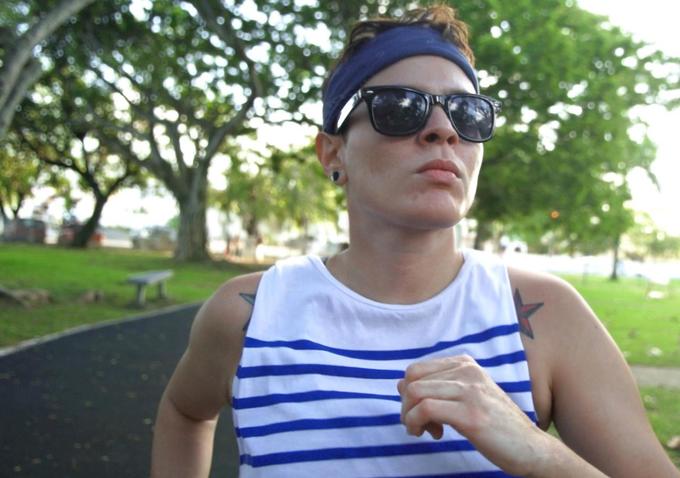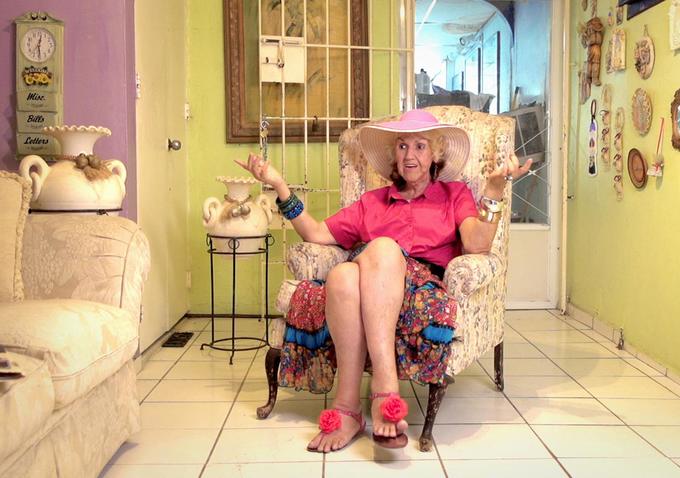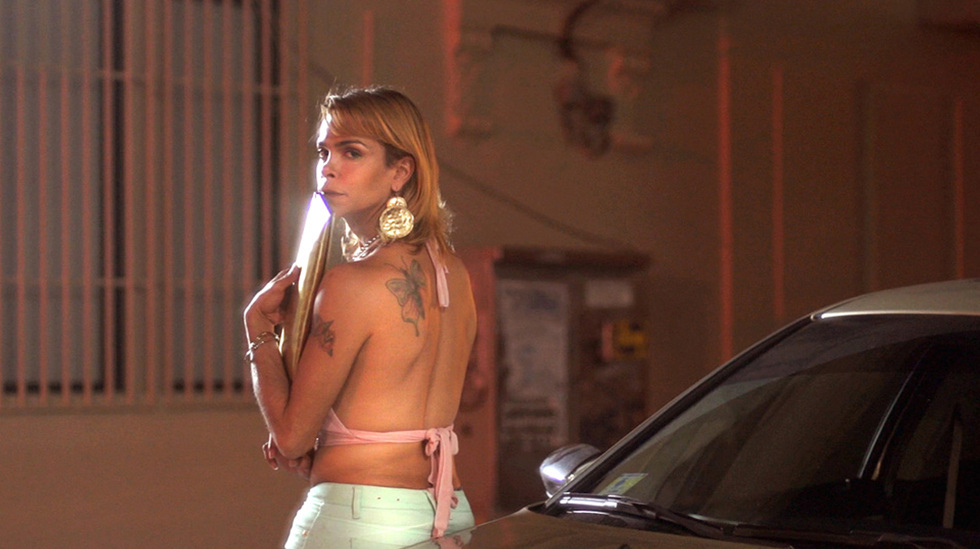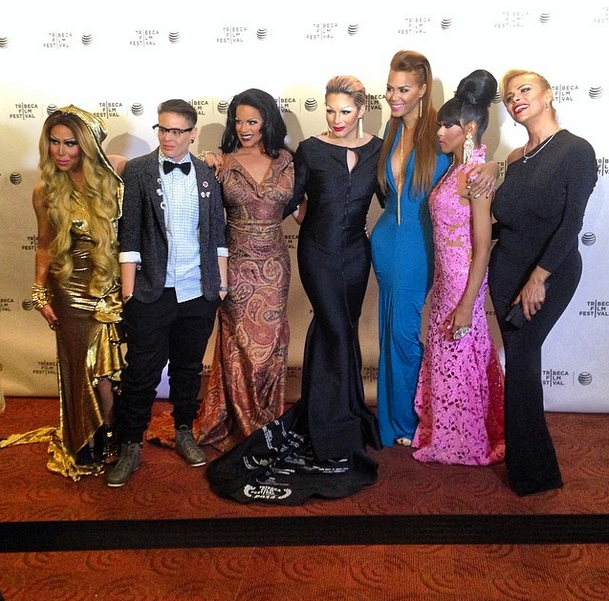As I walked into the conference room for my interview with the directors and subjects of Mala Mala, my heart skipped a beat at the gorgeous display of welcoming enthusiasm, fierce divas, eclectic personalities, and fabulous wardrobe choices that greeted me. An official selection for the world documentary competition, Mala Mala received a standing ovation following its international premiere at this year’s Tribeca Film Festival, and for good reason. Directed by Dan Sickles and Antonio Santini, this dynamic and riveting documentary examines the trans community in Puerto Rico; offering a unique exploration of the self-discovery, activism and struggles facing these individuals. Featuring an array of subjects that include sex workers, drag performers, and LGBTQ advocates, Mala Mala offers an intimate and articulate look at the island’s transgender community through the lens of various professions, ages, backgrounds, and perspectives. Imbued with a candy-colored cinematography that reflects its effervescent subjects, this film dissects the diverse facets of gender nonconformity existing within Puerto Rico’s queer population, and how these individuals navigate the intersection of their gender and cultural identities.
Mala Mala begins on a festive and vibrant note as we are first introduced to the island’s well-known drag troupe “The Doll House” through an opening montage whose style is uncannily reminiscent of the 90’s Club Kid scene. The narrative gradually grows more serious as we meet other individuals through various stages of transition; including Sandy (featured image), an unapologetic and inspiring prostitute with a captivating charisma; Paxx, the film’s only gender-queer biological female aspiring to an FTM transition despite having no medical or educational support system; Ivana, the island’s most famous trans rights activist and public figure who travels throughout the capital handing out condoms and flyers to sex workers; Samantha, who transitioned through hormones sold on the black market and must now cope with the resulting health complications; and Soraya, an incredibly wise elderly woman who does not consider herself trans at all. These various stories ultimately converge during the second half of the film, as our characters’ non-profit organization “The Butterfly Trans Foundation” leads a successful fight for equal employment and healthcare rights during an LGBTQ rally in the island’s capital city.

Documenting the daily lives of their subjects over the course of three years, Sickles and Santini paint an articulate and tasteful portrait of each individual’s humanity and beauty without any sense of exploitation. With an aesthetic tone that reflects the diverse personalities portrayed, Mala Mala reveals the richness of Puerto Rico’s trans scene, and in doing so draws a fascinating parallel between the trans community and Puerto Rican culture as a whole. However, as much as the film is about these trans and queer folk carving out a place for themselves in society, it is just as much a celebration of their uniqueness. Whether using boldly fluorescent color schemes to illuminate the flamboyant drag scene, or filming Sandy with a reserved air of dignity as she roams the streets of San Juan, Sickles and Santini intimately capture these moments in a way that is candid yet respectful.
What makes Mala Mala resonate so strongly with audiences is its power to move you on both an emotional and intellectual level. The diverse stories and experiences shared in the film allow each individual to offer incredibly thoughtful insights that are humbling, self-aware, and at times refreshingly contradictory to one another. For example, one of the most memorable moments in the film occurs early on as Soraya and Ivana discuss how they identified themselves growing up, particularly as adolescents. When Ivana claims she always considered herself a trans woman, Soraya rejects such a label—stating that she is and always was simply a heterosexual woman. Elaborating on her ideology, Soraya continued to assert that a transsexual* identification is not relevant to her, because it is a label primarily associated with the ‘aesthetics of physical perfection’. According to Soraya, the discourse of the past shouldn’t be concerned with trans identification, but rather with understanding gender dysphoria; for she considers the term “transsexual” to be closely associated with the superficial aspiration of attaining a flawless image, whereas gender dysphoria is a psychological phenomenon that allows one to internalize the essence of the opposite gender. Says Soraya; “I’ve met many transsexuals that look like stunning Barbie Dolls, yet halfway through their transition—when they actually witness their anatomical transformation—they freak out and voila! ‘transsexual’ gets the boot! These individuals soon realize that they didn’t necessarily want to become a woman, but a beauty queen. On the contrary, it is gender dysphoria that allows you to embody the other gender in mind, body, and soul.”

Yet another subject featured in the film is Alberic; a Regina George obsessed, Marilyn Monroe idolizing member of The DollHouse who offers an intelligible drag perspective: “I have many ideas of what I want to be, and none of them have to have a specific gender. These ideas come from a place within the heart and that is called inspiration. I admit that once I realized drag was an alter-ego and not a persona, I didn’t love it as much. But what people don’t understand is that I can be proud to be a man while still finding empowerment in drag. It is a beautiful illusion: a re-creation of myself into a fabulous female.”

Sitting down with the Mala Mala team, I was eager to address the myriad of questions their film inspired, and what ensued was a passionate and enlightening dialogue. At one point in the conversation, Sandy began describing the trans phobic climate in Puerto Rico; “Gays and lesbians are completely accepted and assimilated into society; many couples openly display affection in public with no problem at all. Even drag queens are seen as a celebrity; appearing on TV series like RuPaul’s Drag Race as that glamorous diva who will put on a fierce show. But transsexuals are either discriminated against or completely disregarded in society. People wonder why there are so many trans sex workers in Puerto Rico? It’s because there are no jobs being given to us—all an employer has to do is look at your birth certificate and it’s over. I mean, women are still being oppressed in the workforce—so you can only imagine how impossible it is for a trans woman! We are merely seen as a fetishized sex object: only visible during the nighttime to entertain at a club or please on the streets. But, we have to appreciate the progress one step at a time, and passing Senate Bill 238 was a big victory!” So what’s in store for The Butterfly Foundation? “We are working on building public retirement homes for the elderly trans population in our community”, adds Ivana.
Unapologetic and unconventional, Mala Mala is a modern investigation into the lives of a marginalized group of people, and how these individuals balance the dualities of their inner and outer identities. Presenting the film’s complexities through an immersive and visually stylistic lens; Sickles and Santini thoroughly capture their subjects’ struggles in embracing their nonconformity, all the while striving to achieve that universal notion of “passability”. In the words of the filmmakers; “At its core, this film is a people piece. We are interested in the relationship between the internal and external being, the dynamics between performance and gender, and the power of self-discovery.”
*This term was used throughout the film by our interviewees directly, and is not meant to offend. Please allow for any language or cultural differences in terminology.



